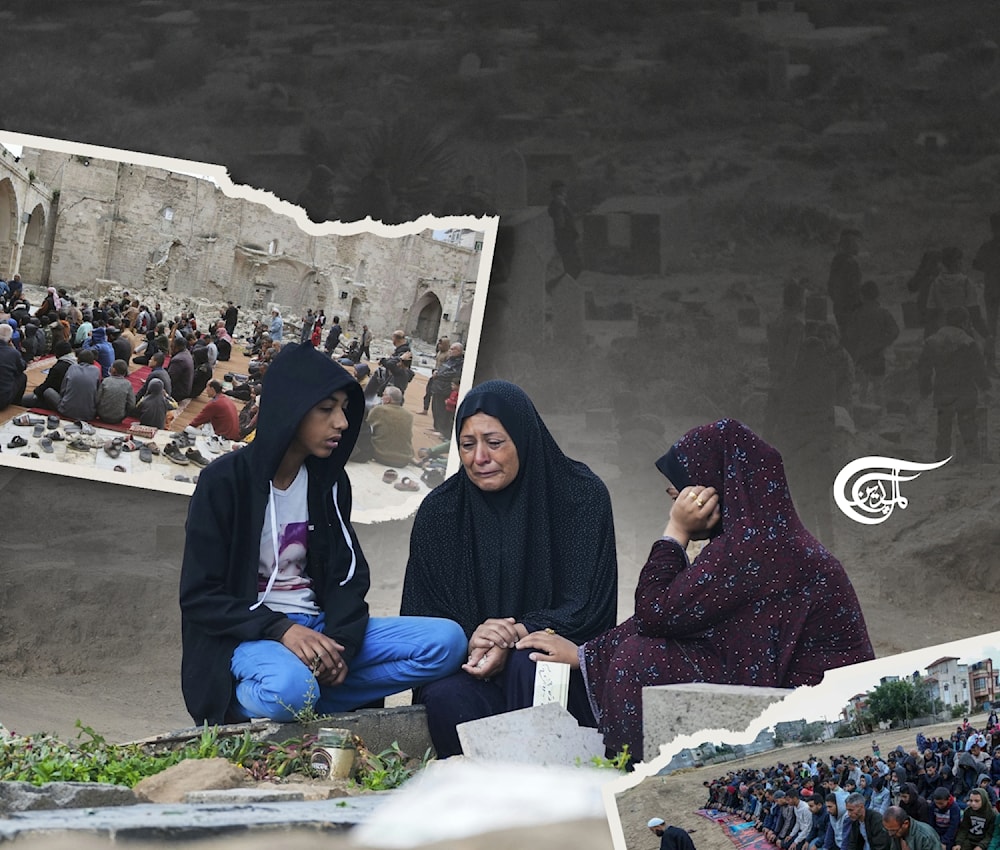Eid el Fitr 2024 in Gaza: Somber, Grievous and Destructive
This Eid was simply one that no Gazan could ever forget. It came as 2.2 million people lacked enough food to eat.
-

Eid Ul Fitr 2024 in Gaza- Somber, Grievous, and Destructive (Illustrated by Mahdi Rteil to Al Mayadeen English)
As Eid festivities were celebrated with pomp, zeal, and fervor across the world, the status quo of bombardments, displacements, genocide, and violence in Gaza remained. This year’s Eid shed light on the harsh realities Gazans have to contend with including dwindling food supplies, compromised access to water, and hospitals being destroyed across the occupied strip. Adding to the dilapidation are homes being leveled and children in despair which has made this Eid a somber, grievous, and destructive occasion. It stands in stark contrast to previous celebrations under Israeli occupation which were comparatively more festive, colorful, and illuminating. For Palestinians this year, there was a notable lack of joy, optimism, positivity, and hope that there will be any meaningful change to their current plight.
While typically Eid Ul Fitr is about families meeting relatives, sharing large meals, and benefiting from a financial spur in rejuvenated markets buoyed by the arrival of Eid, Gazans were simply glad that they were alive. Their gifts were belongings left amid the rubble and debris as devastated families searched dilapidated buildings for sources of festivity and optimism. Children, who constitute 2% of the entire population massacred by the Israeli occupation forces since October 2023, were seen waking up to the harsh reality of their parents being no longer with them and relied on communal support to get by, heal, and rejuvenate themselves, let alone celebrate Eid.
This Eid was simply one that no Gazan could ever forget. It came as 2.2 million people lacked enough food to eat, let alone hold dinner parties while 50% of the population was and continues to be on the brink of starvation. More than 33,400 lives have been lost of which the majority are women and children while more than 76,000 Gazans are either injured or languishing in hospitals that are bombarded by a genocidal regime adamant on ethnic cleansing. Since October 2023 more than 70% of homes have either been damaged or destroyed which comes as Israeli settlers set fire to dozens of homes in the occupied West Bank. During Eid, many Gazans mourned the loss of their loved ones and buried them amid apprehensions that the Zionist occupation forces would conduct raids in Rafah, a fact acknowledged by Netanyahu himself.
Such harrowing realities can be contrasted with how Eid was celebrated in Gaza in 2022. While true that the occupation back then was deeply entrenched and incursions by Zionists in the Al-Aqsa compound did take place during Ramadan, Gazans managed to exchange Eid greetings, hold social gatherings, and have considerable food to eat and drink to celebrate the occasion with relative calm and comfort. There was no genocide taking place back then despite the calculated, discreet, and state-sanctioned erosion of Palestinian rights by the Zionist regime. Eid in 2024 however came amid collective prayers taking place in the remains of destroyed mosques such as the Al Farouq Mosque next to Bani Suhayla and amid Israeli surveillance in the Al Aqsa compound.
The only thing that did not dampen were the spirits of an occupied population despite a lack of hope that the status quo would change either through the Zionist war machinery seizing its senseless killing or through international pressure being exerted on the Netanyahu regime. Acknowledgment of little hope does not entail a lack of faith which has remained consistent throughout the genocide and during Eid festivities as well. Eid Ul Fitr prayers, for example, were conducted as Israeli drones were buzzing above in Rafah and prayers took place in close proximity to ruined mosques, buildings, and homes as a symbolic rebuttal to operations from Zionists aimed at displacing Palestinians. Such acts of resolve and defiance enforced the widely held conviction that come what may, Palestinians will never leave their land. Such resolve was a commendable sight given that Israelis have bombed mosques, hospitals, schools, roads, internet infrastructure, and residential buildings and left 26 million tons of rubble and debris in the absence of any accountability. Palestinian musicians also stepped in to try and give joy and solace to the grieving population through melodious tunes.
With Eid festivities over, Palestinians are now waking up to a grim reminder of what is impending for them. Basics in the city are in short supply including sugar, fresh fruit, and vegetables which are either too rare or too expensive. Banking services have collapsed, cash is in short supply and most of the sanitation and power infrastructure has been destroyed. A minimal amount of fuel is allowed to enter the territory, which is insufficient to run generators and pumps. Then comes the undeniable fact that the status quo will not change anytime soon with the Rafah invasion impending which can result in further disaster for a population undergoing a pogrom. Everyone in Rafah is living in desperation of what could unfold as children sit beside roadsides begging for cash.
For the international community, this is another wake-up call. Turning a blind eye to what has unfolded this Eid in Gaza essentially means that the Palestinians have been robbed of their festivities as well as their ethnic identity, right to ownership of land, and above all, right to live. This Eid was about survival for Gazans as they navigated through the status quo and built resolve to counter one of the most brutal genocides in human memory.
This is not what the people of Gaza deserved but exactly what happened on Eid Ul Fitr, 2024.

 Hamzah Rifaat
Hamzah Rifaat
 5 Min Read
5 Min Read











